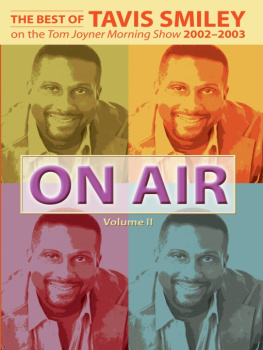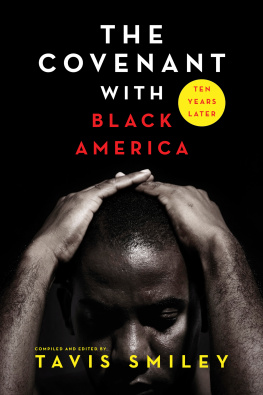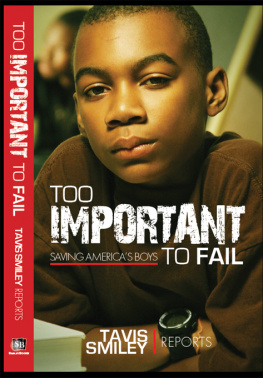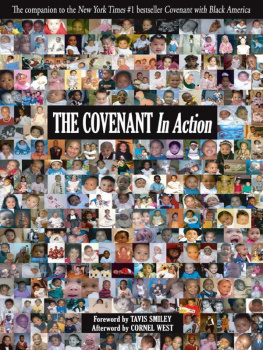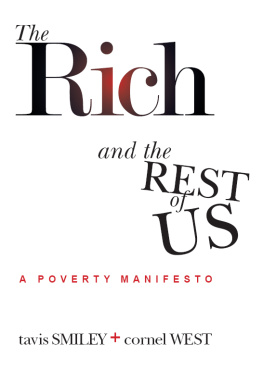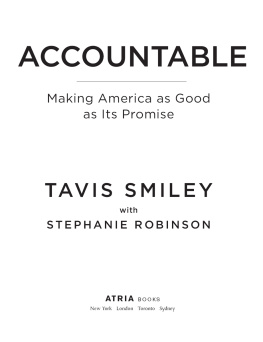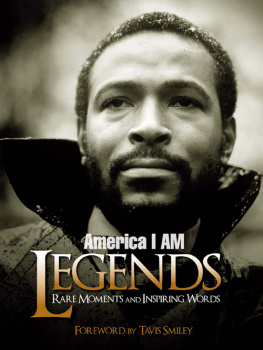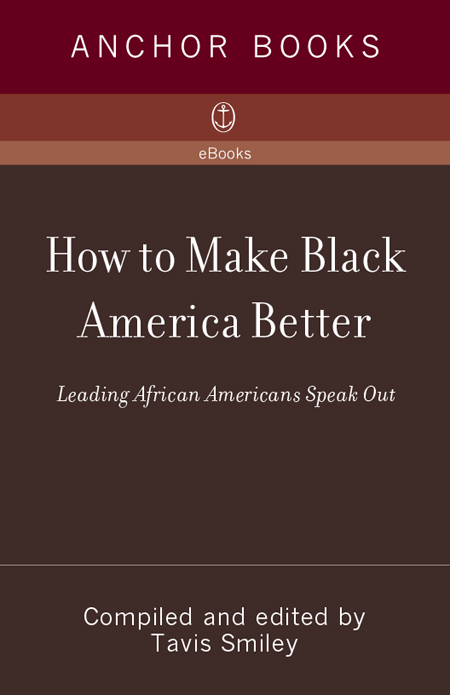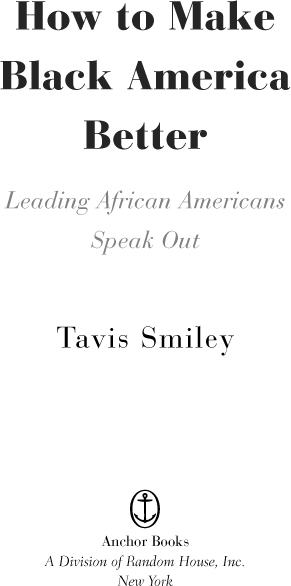Tavis Smiley is a correspondent or contributor for ABC, CNN, and National Public Radio (NPR). His social and political commentary, The Smiley Report, is syndicated by the ABC Radio Network. Additionally, Smiley is a regular contributor to The Tom Joyner Morning Show, a national radio program with an audience of nine million listeners. He is the author of Doing What's Right, Hard Left, On Air, and Just a Thought, and lives in Los Angeles.
Acknowledgments
I'm pressing on the upward way,
New heights I'm gaining every day
Still praying as I'm onward bound,
Lord, plant my feet on higher ground.
My heart has no desire to stay,
Where doubts arise and fears dismay.
Though some may dwell where these abound,
My prayer, my aim is higher ground.
Anyone who has ever seen me on the lecture circuit has no doubt heard me recite these words to one of my favorite Black spirituals, Higher Ground.
For me, life is about taking full advantage of His new mercies every day and finding a way to reach that higher ground.
I am fortunate to have a wonderful and intimate group of people hoisting me up every day as I attempt to do my small part to help make Black America better.
First, to my immediate family: my mother, Joyce Marie Smiley; my father, Emory G. Smiley; and my nine siblings: Pamela, Phyllis, Garnie, Paul, Patrick, Maury Derwin, Weldon, and Dion.
To the folks who I love just like family who put up with me every day in our work at The Smiley Group, Inc.: Wendi Chavis, Kathye Davenport, Andrea Foggy-Paxton, Dawn Fong, Shari Randolph, Raymond Ross, and Karla Thierry.
Special thanks to Sonya Ross, Stephanie Land, Noreen McClendon, Ken Browning, and Errol Collier. Without these folks, especially Sonya, this book would still be in my head and not on paper.
To the world's best editor, Roger Scholl, thank you seems so shallow, but thank you.
For Chi Blackburn and Aubrey O. Prince, thanks for just sticking around here.
To my pastor, Bishop Noel Jones, and my dearest Iyanla Vanzant, thanks for all the coaching, counseling, and caretaking. It's all right now.
Finally, to Harold W. Patrick and Denise Pines. Can't imagine two people who I'd rather share a foxhole with but not for too many days! Thanks for your abiding friendship, sage counsel, and unwavering support.
Contents
| The Freedom Symphony's Fourth Movement by Rev. Jesse L. Jackson, Sr. |
| Part III: Advocacy in the Next Millennium: A Symposium |
| Panel I Panelists:Raymond Brown, Les Brown, Rev. Jamal-Harrison Bryant, Farai Chideya, Stanley Crouch, Dr. Michael Eric Dyson, Danny Glover, Earvin Magic Johnson, Dr. Jawanza Kunjufu, Dr. Julianne Malveaux, Hugh B. Price, Rev. Al Sharpton, Maxine Waters |
| Panel II Panelists:Charles Ogletree, Dr. Naim Akbar, Danny J. Bakewell, Sr., Johnnetta B. Cole, Nikki Giovanni, Lani Guinier, Jesse Jackson, Sr, Jesse Jackson, Jr., Bishop Noel Jones, Randall Robinson, Iyanla Vanzant, Cornel West, Malik Yoba |
Introduction
Tavis, Smiley
As African Americans, each of us must bear the burden of trying to save the soul of Black America.
I say burden because, let's face it, there is much work to be done and the challenges which now face our folks are daunting and complex. Worse, we have not yet been able to convince every brother and sister to share in the burden by shouldering his or her own load. The fact is, we don't have a single African American to waste.
Many of those who best understand our struggle, because they were there on the front lines fighting the good fight and keeping the faith, have passed on. Thurgood Marshall. Daisy Bates. Leon Higginbotham. Other Black national treasures like Rosa Parks, John Hope Franklin, and Dorothy Height are yet with us, but have more days behind them than in front of them.
These brave leaders and countless others have paved the way for the first generation of young Black leaders not born of struggle; the first generation of Black leaders who cannot compare the before and after pictures, because we were born in the postcivil rights era. We represent the fruits of their labor and the hopes of their dreams. Yet too many of us are abrogating our responsibility to our ancestors and to each other. They lived for a cause; we live, too often, just because.
We seem to have forgotten the words of Benjamin E. Mays, who said, He who starts behind in the great race of life must forever remain behind, or run faster than the man in front.
It's time for us to pick up the pace.
I love the wise old saying about the gazelle and the lion. When the gazelle wakes up in the morning, he knows there's somebody out there to eat him. So he'd better be up running. And the lion? When the lion wakes up, he knows that if he doesn't catch anything he'll starve. The point is, it doesn't matter if you're a gazelle or a lion, you'd better wake up in the morning running.
That's how every Black person in America should approach life, as well.
Whether we're young or old, rich and famous, or struggling and trying to come up, every morning we have to wake up running, doing everything we can to help make Black America better.
Recently, I sat down to lunch with John H. Johnson, the visionary founder and publisher of Ebony and Jet magazines. I have long admired Mr. Johnson for his personal contribution and his mission to chronicle the efforts of ordinary and extraordinary Black folks who have done their part to help make Black America better. As I sat there in his private dining room atop the Johnson Publishing Company's Chicago headquarters overlooking Lake Michigan, it struck me that with all Mr. Johnson had accomplished personally and professionally, despite his advanced age and the fact that he clearly was not in the best of health, he was continuing his lifelong mission to help make Black America better. He did that in part by sharing with me the wisdom that only a Black man who has succeeded against all the odds can know.
What I hope to share with you in this book are a few of the simple steps each of us can take to make a meaningful contribution to our community and our country. I had enough good sense to know that when it came to articulating an agenda to improve Black America, I needed a chorus of voices. No one person stands as the spokesperson for Black America.
And so I reached out to a number of Black America's most accomplished and prominent individuals, from various fields of endeavor, to ask them their thoughts on how we can make Black America better. I was fascinated with the thoughts and ideas they expressed, and I think you will be as well.
How to Make Black America Better


